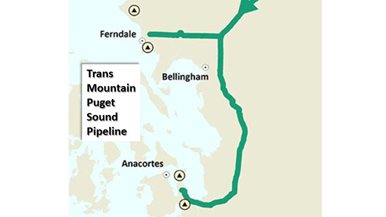As the expressed owner of the pipeline, the Canadian government is required by law to have an approved spill response plan for the pipeline.
The pipeline operator, Trans Mountain Pipeline (Puget Sound) LLC, submitted a plan to Ecology for review and approval.
Following a thorough review of the plan, Ecology has given the company 60 days to add more details about:
- How it would respond to a spill of heavy oils that may sink to the seafloor.
- Endangered killer whales, salmon, and other natural resources that could be harmed from oil spills.
- The initial steps they would take after a spill is discovered.
- Notifying emergency contacts after an oil spill occurs.
“We expect Canada to adhere to the high standards Washington has worked so hard to achieve that protect our environment, economy, and the health of our communities,” said Dale Jensen, manager of Ecology’s Spill Prevention, Preparedness and Response Program.
Following a public review of the proposed response plan, Ecology received 14,000 public comments. All opposed the plan’s ability to address a response to heavy oils that are difficult to clean up once spilled. All opposed the lack of details in the plan on species that are endangered and at risk from potential spills, such as the declining populations of Southern Resident Killer Whales.
While out of scope for this plan, many comments expressed concerns about the planned expansion of the pipeline on the Canadian side of the border. This spill response plan only covers the existing operation of the pipeline that has been transporting oil in Washington since the 1950s.
Ecology oversees the oil spill contingency plan, aimed at protecting human health and the environment. It is outside Ecology’s jurisdiction to permit the pipeline operation or flow of oil.
Ecology requires oil-handling operations in Washington – such as facilities, pipelines, large commercial vessels, and railroads – to have oil spill contingency plans that detail how they would respond to oil spills.
In 2017, the Trans Mountain (Puget Sound) Pipeline carried 2.6 billion gallons of crude oil refineries in Ferndale and Anacortes.


